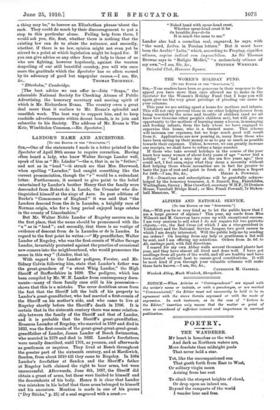LANDOR'S NAME AND ANCESTORS.
[To THE EDITOR OF THE "SrscrATon."1
-Sra,—One of the statements I made in a letter printed in the ,Spectator of April 30th seems to require correction. Having often heard a lady, who knew Walter Savage Landor well, speak of him as " Mr. Landor "—the a, that is, as in "father," and not as in "land "—it struck me that Mrs. Sherwood, when spelling "Larnder," had caught something like the correct pronunciation, though the " r " would be a redundant letter. Furthermore, it seemed to give point to the belief entertained by Landor's brother Henry that the family were descended from Robert de In Lande, the Crusader who dis- tinguished himself at the siege of Acre. In past editions of Burke's "Commoners of England" it was said that "the Landors descend from the de la Laundes, a knightly race of Norman origin, who for a long period enjoyed large estates in the county of Lincolnshire."
But Mr. Walter Noble Landor of Rugeley assures me, in the first place, that the name should be pronounced with the " a " as in " land "; and secondly, that there is no vestige of evidence of descent from de la Laundes or de la Landes. In regard to the first point he writes :—" My grandfather, Walter Landor of Rugeley, who was the first-cousin of Walter Savage Landor, invariably protested against the practice of occasional new-comers into the neighbourhood, who would pronounce the name in this way " (Landor, that is).
With regard to the Landor pedigree, Forster, and Mr. Sidney Colvin following him, state that Landor's father was the great-grandson of " a stout Whig Landor," the High Sheriff of Staffordshire in 1699. The pedigree, which has been compiled by Mr. W. N. Landor from contemporary docu- 'ments—many of them family ones still in his possession— "shows that this is a mistake. The error doubtless arose from the fact that the Sheriff left the bulk of his property to "Landor's great-grandfather, who had married a first-cousin of the Sheriff on his mother's side, and who came to live at Rugeley shortly before the Sheriff's death in 1706. It is "certain that in the sixteenth century there was some relation- ship between the family of the Sheriff and that of Landor, and it is probable that the Sheriff's great-grandfather, Erasmus Launder of Rugeley, who married in 1589 and died in 1633, was the first-cousin of the great-great-great-great-great- grandfather of Landor, James Lander of Beech Swinnerton, 'who married in 1579 and died in 1633. Landor's forefathers were usually described, until 1701, as yeomen, and afterwards as gentlemen or esquires. They lived at Beech throughout the greater part of the sixteenth century, and at Hardiwick, Sandon, from about 1610 till they came to Rugeley. In 1664 Landor's forefather at Sandon and the Sheriff's father at Rugeley both ,claimed the right to bear arms, but were unsuccessful. Afterwards, June 6th, 1687, the Sheriff did obtain a grant of arms, but these were limited to himself and the descendants of his body. Hence it is clear that Landor was mistaken in his belief that these arms belonged to himself and his ancestors. Mention is made in one of his poems (" Dry Sticks," p. 21) of a seal engraved with a crest :—
" Naked band with spear-head crest, Whether spear-head crest it be Or heraldic fleur-de-lis
It is much the same to me."
Landor also had a cornelian seal, engraved, he says, with " the word; Leitas, in Persian letters." But it must have been the Arabic" Leita," which, according to Freytag, signifies utinam, snpius indicat rem impossibilem. As Sir Thomas
Browne says in " Religio Medici," " a melancholy utinata of






















































 Previous page
Previous page